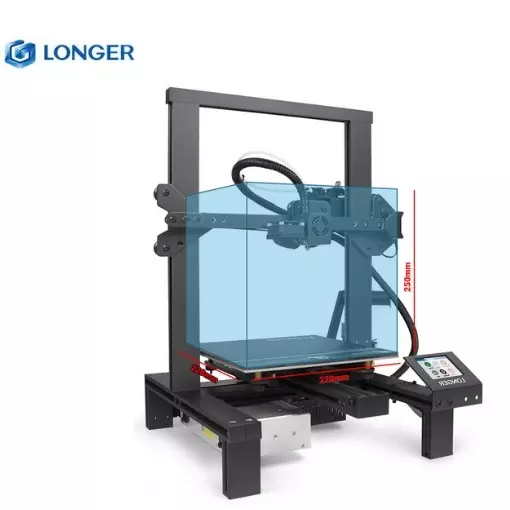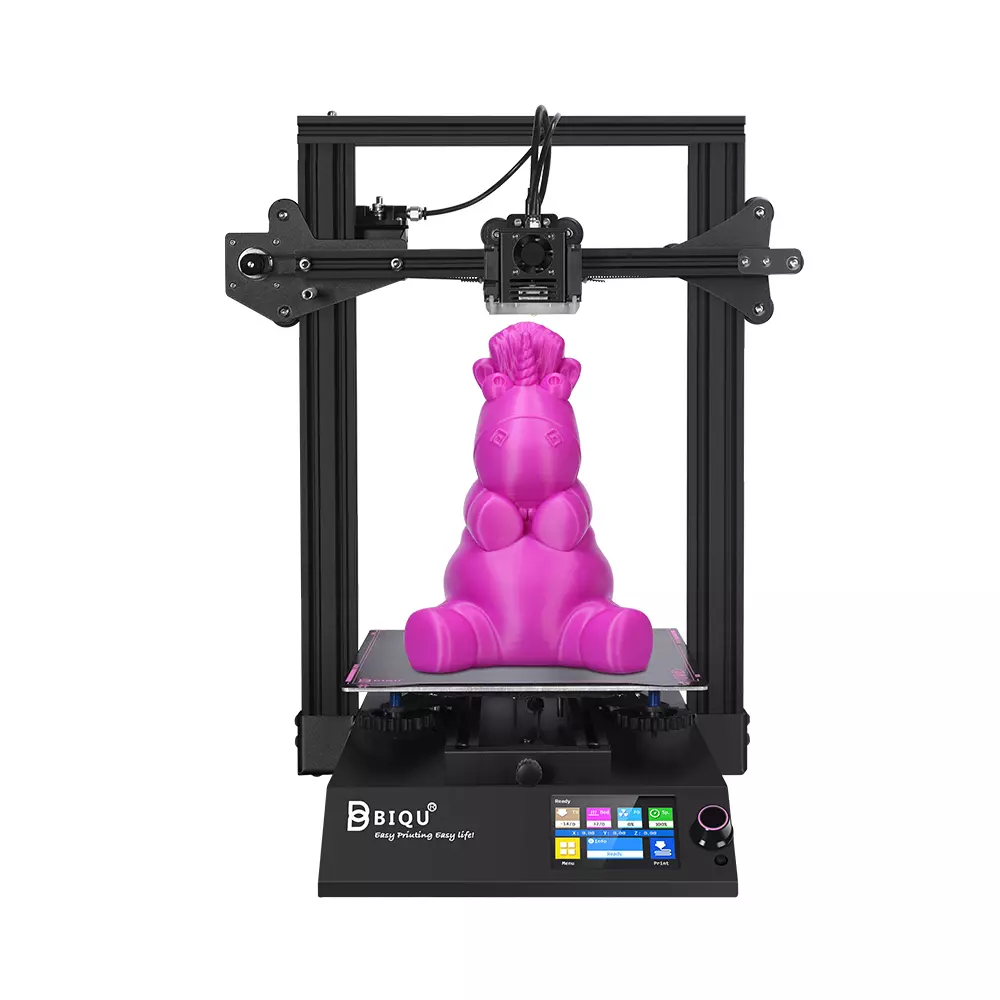Compare LK4 X vs BIQU B1
Comparison between the best 3D printers
Choose the best 3D printer at the best price. The cheapest 3D printers are here.
Buy a 3D printer here with 3D Fila.
 |
 |
|
| Model | LK4 X |
BIQU B1 |
| Printing Material | Filament | Filament |
| Buy Filament for Longer 3D LK4 X | Buy Filament forBigTreeTech BIQU B1 | |
| Estimated price | $299,00 | $269,00 |
| Manufacturer | Longer 3D | BigTreeTech |
| Release Year | 2022 | 2020 |
| Print Volume [mm] | 220x220x250 | 235x235x270 |
| Printer Size [mm] | 465x485x615 | 412x402x492 |
| Weight [kg] | 9,8 | 8,00 |
| Power Loss Recovery | YES | YES |
| Enclosed printer | NO | NO |
| Bed Leveling | Automatic | Manual |
| Filament End Sensor | YES | YES |
| Bed type | Heated | Heated |
| Power supply system | Bowden | Bowden |
| Standard nozzle | 0,4 | 0,4 |
| Maximum Nozzle Temperature [°C] | 250 | 250 |
| Maximum Bed Temperature [°C] | 100 | 100 |
| Maximum printing speed [mm/s] | 120 | 100 |
| Filament holder | YES | YES |
| Camera for supervision | NO | NO |
| Recommended filaments | PLA, TPU, ABS, PETG | PLA, TPU, ABS, PETG |
| Recommended slicers | Cura, Simplify, Slic3r | Cura, Simplify, Slic3r |
| Maximum Resolution [mm] | 0,1 | 0,1 |
| Processor | 8 bits | 32 Bits BTT SKR V 1.4 |
| Display | Touchscreen TFT 4,3'' | Touchscreen TFT 3,5'' |
| Power Supply | 12V / 320W | 24V / 360W |
| Connectivity | SD / USB | SD / USB |
| Operating systems | Windows, Mac, Linux | Windows, Mac, Linux |
| Date of registration in the system | 2021-04-15 | 2021-04-14 |
| Release date | 2022 | 2020 |
| Extra features | Longer LK4 X offers intelligent 16-point auto-leveling and dual direct-gear extruders for precise filament control, compatible with multiple materials. It features an ultra-quiet 32-bit motherboard and open-source firmware, promoting creative freedom. Its PEI film platform ensures strong adhesion and easy model removal. Includes resume printing functions and filament out-of-stock protection. Assembly is simple, with 95% pre-assembled. It has a 4.3-inch touch screen, dual fan kit, low power consumption, manual belt tensioners and improved Teflon tube. | The BIQU B1 is an advanced 3D printer with a silent 32-bit BTT SKR V1.4 motherboard and ARM Cortex-M3 CPU, offering DIY interfaces (I2C, SPI, WiFi) and dual Z-axis. Its dual BTT B1 TFT35 V3.0 operating system allows real-time monitoring and multiple printing modes, including G-code visualization effects. It stands out for its BIQU SSS (Super Spring Steel), ensuring easy model adhesion and simplified removal, with the possibility of using it on both sides. It includes a filament sensor, automatically pausing printing in case of filament breakage. The multicolored RGB lights integrated into the hotend allow you to view the printing status even at night. Additional notes include the need for a BIQU-specific Type-C cable and extra interfaces for smart filament sensor and BL Touch. |
| Support for multiple colors and materials (AMS and CFS) | NO | NO |
Notes * |
||
| Cost-benefit | 7 / 10 | 6 / 10 |
| Hardware | 2.8 / 10 | 2 / 10 |
| Tela | . | . |
| Print volume | 3 / 10 | 3 / 10 |
| Performance | 1 / 10 | 0 / 10 |
Conclusion |
| In conclusion, both the Longer 3D LK4 X and the BIQU B1 offer distinct advantages for users seeking a reliable and efficient 3D printing experience. The LK4 X, being a newer model, boasts advanced features such as intelligent 16-point auto-leveling, a larger touchscreen display, and dual direct-gear extruders, enhancing its capability for precise filament control and ease of use. Its robust construction and features geared toward making assembly simple and user-friendly provide a solid option for beginners and hobbyists alike. Conversely, the BIQU B1, while slightly older, leverages a powerful 32-bit motherboard and ARM Cortex-M3 CPU, catering to users interested in customization and advanced DIY options. Its dual Z-axis and innovative design features, such as the BIQU SSS for easier model removal and real-time monitoring capabilities, lend it an edge for more experienced users or those looking to expand upon printing functionalities. When considering price, the Longer 3D LK4 X is slightly more expensive, but this may be justified by its enhanced user interface and features. Alternatively, the BIQU B1 offers excellent value, making it a strong option for users looking to keep costs lower while still investing in a versatile machine. Ultimately, the choice between the two printers will largely depend on individual priorities, such as budget, experience level, and specific printing needs. Both printers have their merits and can serve their user base effectively, making either a worthwhile investment for those looking to enter or advance their journey in the world of 3D printing. |

